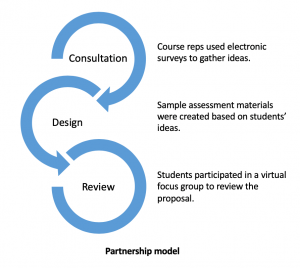
Lucy Hart (student – trainee PWP)- l.hart@student.reading.ac.uk
Tamara Wiehe (staff – PWP Clinical Educator)- t.wiehe@reading.ac.uk
Charlie Waller Institute, School of Psychology and Clinical Language Sciences
Overview
This case study re-designed an assessment for two Higher Education programmes where students train to become Psychological Wellbeing Practitioners (PWP) in the NHS. The use of remote methods engaged harder to reach students in the re-design of the assessment tool. The project promotes the effectiveness of partnership working across diverse learning communities, by placing student views at the centre of decision making. In line with one of the University’s principles of partnership (2018) – shared responsibility for the process and outcome – this blog has been created by a student involved in the focus group and the member of teaching staff leading the project.
Objectives
- Improve the design of an assessment across the University’s PWP training programmes.
- Involve students throughout the re-design process, ensuring student voices and experiences are acknowledged.
- Implement the new assessment design with the next cohorts.
Context
It was proposed by students in modular feedback and staff in a quarterly meeting that the design of an assessment on the PWP training programmes could be improved. These programmes are grounded in evidence-based, self-reflective and collaborative practice. Therefore, it was appropriate to maintain this style of working throughout the process. This was achieved through the students reflecting on their experiences when generating ideas and reviewing the re-designed assessment.
Implementation
Traditional methods of partnership were not suitable for our students due to the nature of the PWP training programmes. Their week consists of one teaching day running from 9:30-4:30, a study day and three days practising clinically as a trainee PWP in an NHS service. Location was another factor as many of our students commute to University and live closer to their workplace. The use of technology and remote working enabled us to overcome these barriers and work in partnership with our students.
The partnership process followed these three steps:
When generating ideas and reviewing the proposed assessment, we, the professional practice students, considered the following points:
- Assessment design – consistency in using vignettes throughout the course meaning students will be familiar with this method of working. Word limit ensures concise responses.
- Time frame – the release date of the essay in proportion to the examination date.
- Feasibility – will there be enough study days to compensate for the change in design allowing trainees to plan their essays.
- Academic support – opportunities within the academic timetable to provide additional supervision-style sessions later in the module to support students.
- Learning materials – accessibility to resources on blackboard. Assigning study days to allow planning of essay.
Impact
- It was agreed that the original ICT would be replaced with written coursework based on a vignette and implemented with our next cohorts.
- The assessment aligned with the module learning outcomes and student experiences were considered in a meaningful way.
- Harder to reach students were able to engage in the re-design of the assessment through effective communication methods.
Reflections
Student perspective:
“Being the expert of our experiences, it was refreshing to have our voices and experiences heard. We hope the re-design supports future cohorts and reduces anxieties around managing both university and service-based training. The focus group was a success due to the clear agenda setting and feasibility of remote online working. It can be proposed that a larger focus group would have beneficial during the review stage to remove biases associated with a small sample size.”
Staff perspective:
“Student input allowed us to hear more about their experiences during the training and took a lot of pressure off of staff to always be the ones coming up with solutions. The outcomes have a far reaching impact beyond that of the students and staff on the programme in terms of engaging diverse learning communities in Higher Education and forming more connections between Universities and NHS services. Although inclusivity and diversity was considered throughout, more participants in the virtual focus group would improve this further. Students could also have more power over the creation of the assessment materials themselves. Both of these reflections will inform my professional practice going forwards.”
